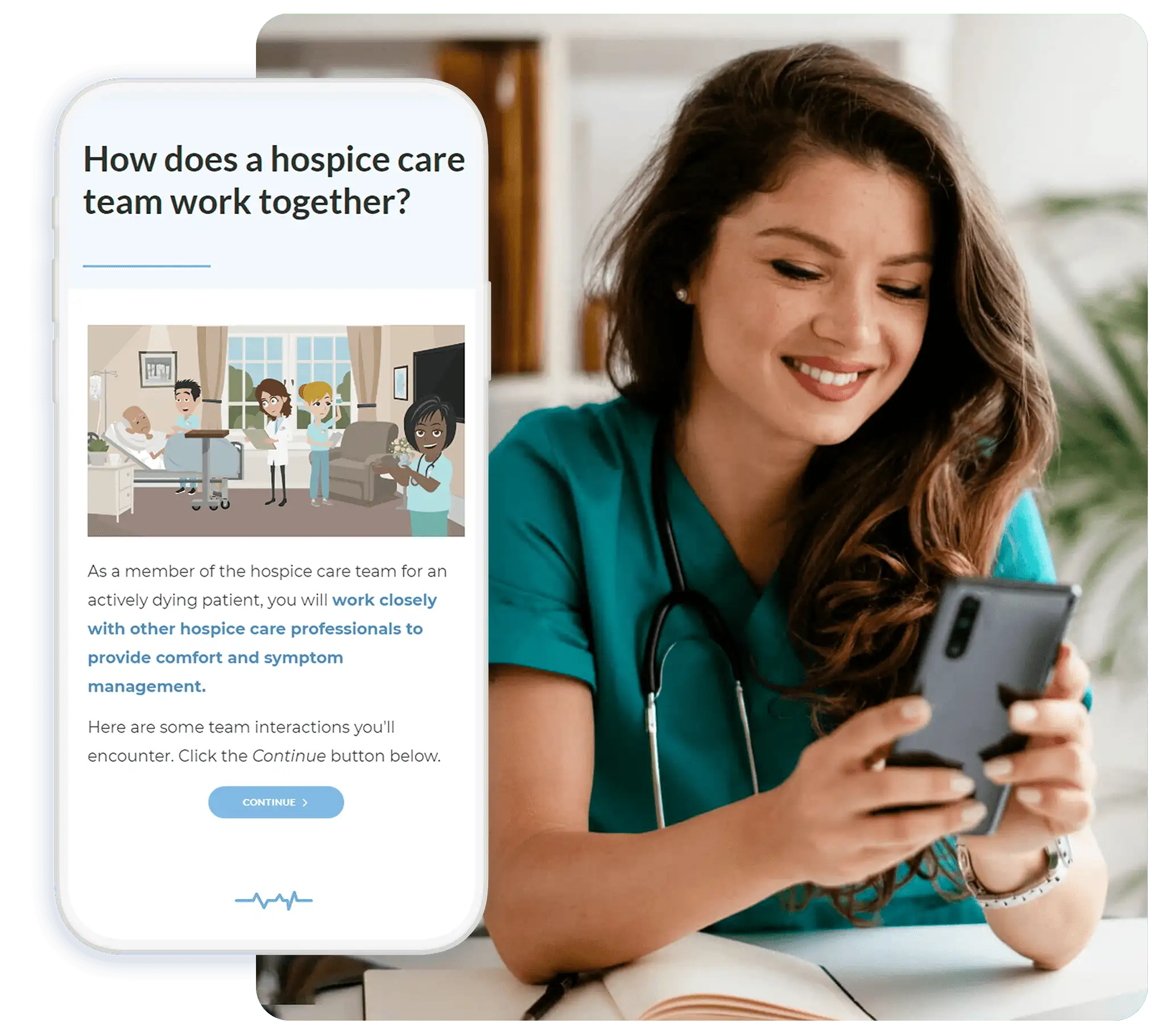A Guide to Food and Fluids at the End of Life
Introduction
As a person approaches death a natural slowing down of the body’s physical and mental systems occurs. Because the needs of the body are changing, the need for food and fluids naturally decreases as the person nears the end of life.
It is not unusual for the sense of taste to diminish and/or the person to begin to have difficulty swallowing. As the body’s systems slow, the need for caloric intake also diminishes. This is a normal process near the end of life. Food that has fueled healing in the past may now only bring about discomfort and possibly even pain. (Martin 1995)

CONTINUA LEARNING
Simplify Your Hospice Team’s Training and Skill Building
A complete solution for your agency: more than 125 hospice courses, caregiver in-services, training plans, and more.
When Are Artificial Food and Fluids Considered?
- When a person is nearing the end of life, adding artificial food and fluids is not likely to make the person stronger or prolong their life and may cause uncomfortable symptoms.
- When a person with a temporary or chronic illness is expected to recover and can’t swallow or properly digest food and fluids, a feeding tube or intravenous fluids may help.
What May Happen if Artificial Fluids and Nutrition Are Given Near the End of Life?
- Artificial food and fluids may make some symptoms worse because the body systems are slowing and cannot process the food and fluids it does not need.
- Feeding tubes may put a person at increased risk for pneumonia, and may also cause pain, nausea and vomiting.
- Tubes for food and fluids are potential sites for infection.
- In a person who is dying, artificial food and fluids may increase fluid in the lungs, create difficulty in breathing, cause nausea, vomiting and urinary incontinence.
What Happens if Artificial Food and Fluids Are Not Given Near the End of Life?
- Dehydration from being unable to take in food or fluids does not affect the dying patient in the same way as a healthy person who feels thirsty on a hot day. (EPEC Project, 1999)
- The lack of fluids seems to produce a natural anesthetic effect, often allowing for a reduction of pain medication. (Printz 1988)
- Dehydration will reduce urine output and often provides a decrease in awareness of pain and other uncomfortable symptoms. It may help contribute to a peaceful, comfortable death for many persons. (Printz 1988)
- Near the end of life, if the person is unable to take any food or fluids, they will gradually become weaker and sleep more.
Will the Person Nearing Death Who Does Not Receive Artificial Food and Fluids Be Thirsty?
- Usually, the person does not experience thirst or hunger.
- If a person has thirst, it will only last a day or so and ice chips or small sips of fluid with good oral care should relieve this symptom.
What Can Be Done to Provide Comfort?
- If the person is awake it may be comforting to offer ice chips if they can be tolerated.
- The person will also benefit from frequent oral care with a soft brush or sponge to relieve any dryness in the mouth. A saline spray to the mouth may also be comforting.
- Moisten the person’s eyes, or use a warm, damp cloth over them a few times each day.
- Moisten the person’s lips, and use lip balm to prevent dryness.
- Use lotion without alcohol added to maintain skin comfort.
Sources
Burge, F, Dehydration Symptoms of Palliative Care Cancer Patients. Journal of Pain and Symptom Management, 1993:8(7) 454-464.
Dalal, S., Del Fabbro, E., Bruera, E., (March 2009). Is there a role for hydration at the end of life? Current Opinion in Supportive and Palliative Care. Vol 3-Issue 1- p. 72-78.
EPEC Project, Module 11, 1999: Withholding, Withdrawing Therapy.
Enteral and parenteral nutrition in terminally ill cancer patients: A review of the literature. Am J of Hospice and Palliative Care 2006; 23(5):369-377.
Lanuke K, Fainsinger RL, deMoissac D. (2004) Hydration management at the end-of-life. Journal of palliative Medicine; 7 (2): 257-263.
Martin, P.K., Strain, J, (1995) The Ethics of Artificial Hydration and Nourishment, Fanfare. Vol IX, (3): 16-17.
McCann, RM, Hall, WJ, Groth-Juncker, A, Comfort Care for Terminally Ill Patients: The Appropriate Use of Nutrition and Hydration, JAMA October 26, 1994 272 (16) pp 1263-1266.
Moynihan T, Kelly DG, Fisch MJ. (2005) To feed or not to feed: Is that the right question? Journal of Clincal Oncology 23(25): 6526-6529.
Owens DA. Hydration in the terminally ill. (2007). J Hospice Palliative Care; 9:122-123.
Printz, L. (1988). Is Withholding Hydration a Valid Comfort Measure in the Terminally Ill? Geriatrics Advisor. 43(11):84-88.
Strasser F. Bruera E. (2002) Update on anorexia and cachexia. Hematol Olcol Clin North Am; 16:589-617.
If you found this article informative and useful share it with your friends and colleagues.
